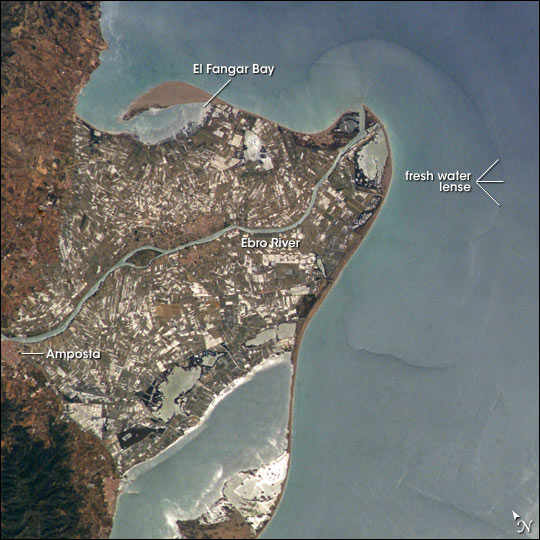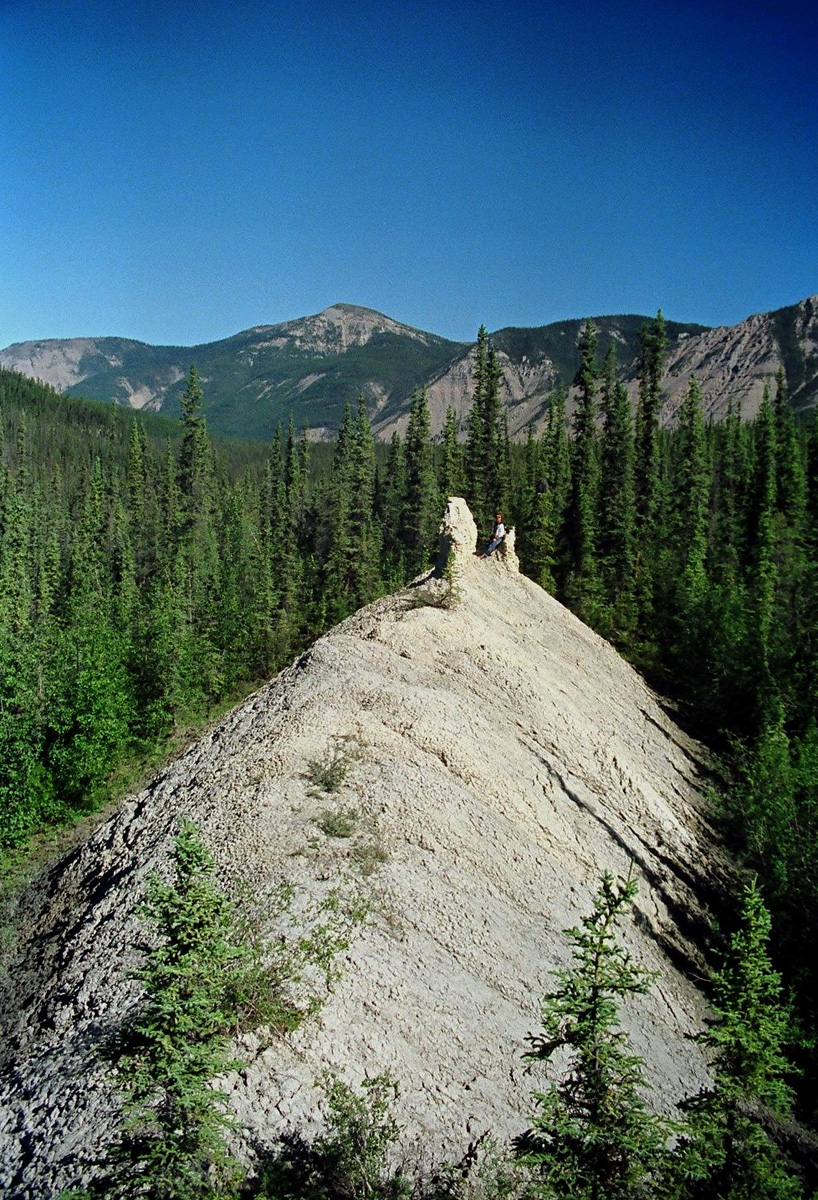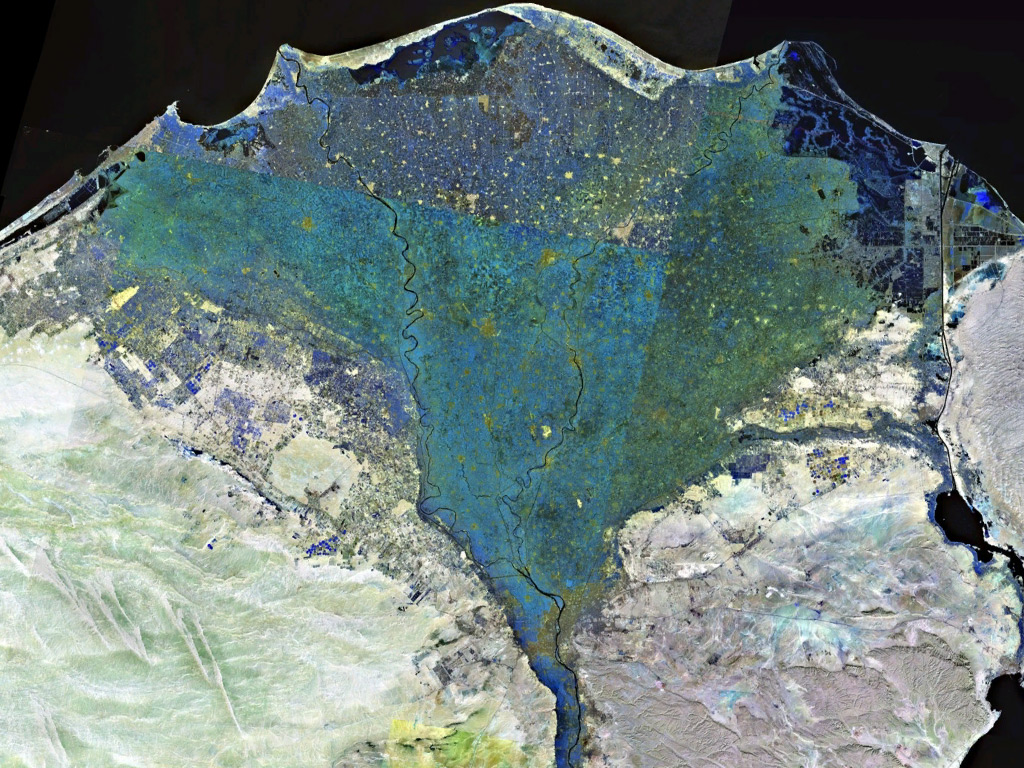|
Deltas
A river delta is a landform shaped like a triangle, created by deposition of sediment that is carried by a river and enters slower-moving or stagnant water. This occurs where a river enters an ocean, sea, estuary, lake, reservoir, or (more rarely) another river that cannot carry away the supplied sediment. It is so named because its triangle shape resembles the Greek letter Delta. The size and shape of a delta is controlled by the balance between watershed processes that supply sediment, and receiving basin processes that redistribute, sequester, and export that sediment. The size, geometry, and location of the receiving basin also plays an important role in delta evolution. River deltas are important in human civilization, as they are major agricultural production centers and population centers. They can provide coastline defense and can impact drinking water supply. They are also ecologically important, with different species' assemblages depending on their landscape position. ... [...More Info...] [...Related Items...] OR: [Wikipedia] [Google] [Baidu] |
Silt
Silt is granular material of a size between sand and clay and composed mostly of broken grains of quartz. Silt may occur as a soil (often mixed with sand or clay) or as sediment mixed in suspension with water. Silt usually has a floury feel when dry, and lacks plasticity when wet. Silt also can be felt by the tongue as granular when placed on the front teeth (even when mixed with clay particles). Silt is a common material, making up 45% of average modern mud. It is found in many river deltas and as wind-deposited accumulations, particularly in central Asia, north China, and North America. It is produced in both very hot climates (through such processes as collisions of quartz grains in dust storms) and very cold climates (through such processes as glacial grinding of quartz grains.) Loess is soil rich in silt which makes up some of the most fertile agricultural land on Earth. However, silt is very vulnerable to erosion, and it has poor mechanical properties, making construction ... [...More Info...] [...Related Items...] OR: [Wikipedia] [Google] [Baidu] |
River
A river is a natural flowing watercourse, usually freshwater, flowing towards an ocean, sea, lake or another river. In some cases, a river flows into the ground and becomes dry at the end of its course without reaching another body of water. Small rivers can be referred to using names such as Stream#Creek, creek, Stream#Brook, brook, rivulet, and rill. There are no official definitions for the generic term river as applied to Geographical feature, geographic features, although in some countries or communities a stream is defined by its size. Many names for small rivers are specific to geographic location; examples are "run" in some parts of the United States, "Burn (landform), burn" in Scotland and northeast England, and "beck" in northern England. Sometimes a river is defined as being larger than a creek, but not always: the language is vague. Rivers are part of the water cycle. Water generally collects in a river from Precipitation (meteorology), precipitation through a ... [...More Info...] [...Related Items...] OR: [Wikipedia] [Google] [Baidu] |
Nile Delta
The Nile Delta ( ar, دلتا النيل, or simply , is the delta formed in Lower Egypt where the Nile River spreads out and drains into the Mediterranean Sea. It is one of the world's largest river deltas—from Alexandria in the west to Port Said in the east, it covers of Mediterranean coastline and is a rich agricultural region. From north to south the delta is approximately in length. The Delta begins slightly down-river from Cairo. Geography From north to south, the delta is approximately in length. From west to east, it covers some of coastline. The delta is sometimes divided into sections, with the Nile dividing into two main distributaries, the Damietta and the Rosetta, flowing into the Mediterranean at port cities with the same name. In the past, the delta had several distributaries, but these have been lost due to flood control, silting and changing relief. One such defunct distributary is Wadi Tumilat. The Suez Canal is east of the delta and enters the coa ... [...More Info...] [...Related Items...] OR: [Wikipedia] [Google] [Baidu] |
Prometheus Bound
''Prometheus Bound'' ( grc, Προμηθεὺς Δεσμώτης, ''Promētheús Desmṓtēs'') is an Ancient Greek tragedy traditionally attributed to Aeschylus and thought to have been composed sometime between 479 BC and the terminus ante quem of 424 BC. The tragedy is based on the myth of Prometheus, a Titan who defies Zeus, and protects and gives fire to mankind, for which he is subjected to the wrath of Zeus and punished. C. J. Herington claims that Aeschylus certainly did not mean ''Prometheus Bound'' to be a "self-contained dramatic unity", and suggests that "most modern students of the subject would probably agree" that ''Prometheus Bound'' was followed by a work with the title ''Prometheus Lyomenos (Prometheus Unbound)''. Herington adds that "some very slight evidence" indicates that ''Prometheus Unbound'' "may have been followed by a third play", ''Prometheus Pyrphoros (Prometheus the Fire-Bearer)''; the latter two survive only in fragments. Some scholars ha ... [...More Info...] [...Related Items...] OR: [Wikipedia] [Google] [Baidu] |
Alexander The Great
Alexander III of Macedon ( grc, wikt:Ἀλέξανδρος, Ἀλέξανδρος, Alexandros; 20/21 July 356 BC – 10/11 June 323 BC), commonly known as Alexander the Great, was a king of the Ancient Greece, ancient Greek kingdom of Macedonia (ancient kingdom), Macedon. He succeeded his father Philip II of Macedon, Philip II to the throne in 336 BC at the age of 20, and spent most of his ruling years conducting a lengthy military campaign throughout Western Asia and ancient Egypt, Egypt. By the age of thirty, he had created one of the List of largest empires, largest empires in history, stretching from Greece to northwestern Historical India, India. He was undefeated in battle and is widely considered to be one of history's greatest and most successful military commanders. Until the age of 16, Alexander was tutored by Aristotle. In 335 BC, shortly after his assumption of kingship over Macedon, he Alexander's Balkan campaign, campaigned in the Balkans and reasserted control ... [...More Info...] [...Related Items...] OR: [Wikipedia] [Google] [Baidu] |
Onesicritus Of Astypalaea
Onesicritus ( el, Ὀνησίκριτος; c. 360 BC – c. 290 BC), a Greek historical writer and Cynic philosopher, who accompanied Alexander the Great on his campaigns in Asia. He claimed to have been the commander of Alexander's fleet but was actually only a helmsman; Arrian and Nearchus often criticize him for this. When he returned home, he wrote a history of Alexander's campaigns. He is frequently cited by later authors, who also criticize him for his inaccuracies. Life He was a native of Astypalaia, and it was probably to this island origin that he owed the nautical skills which would prove so advantageous to him. He was a disciple of Diogenes of Sinope, the Cynic philosopher. Diogenes Laërtius also calls him "Onesicritus of Aegina", and says that he came to Athens because his two adult sons, Androsthenes and Philiscus, were attracted to the philosophy of Diogenes the Cynic, whence Onesicritus also became an ardent disciple. If so, he must have been already advanced ... [...More Info...] [...Related Items...] OR: [Wikipedia] [Google] [Baidu] |
Cynicism (philosophy)
Cynicism ( grc, κυνισμός) is a school of thought of ancient Greek philosophy as practiced by the Cynics ( grc, Κυνικοί; la, Cynici). For the Cynics, the purpose of life is to live in virtue, in agreement with nature. As reasoning creatures, people can gain happiness by rigorous training and by living in a way which is natural for themselves, rejecting all conventional desires for wealth, power, and fame, and even flouting conventions openly and derisively in public. Instead, they were to lead a simple life free from all possessions. The first philosopher to outline these themes was Antisthenes, who had been a pupil of Socrates in the late 400 BC. He was followed by Diogenes, who lived in a ceramic jar on the streets of Athens. Diogenes took Cynicism to its logical extremes, and came to be seen as the archetypal Cynic philosopher. He was followed by Crates of Thebes, who gave away a large fortune so he could live a life of Cynic poverty in Athens. Cynicism gradua ... [...More Info...] [...Related Items...] OR: [Wikipedia] [Google] [Baidu] |
Strabo
Strabo''Strabo'' (meaning "squinty", as in strabismus) was a term employed by the Romans for anyone whose eyes were distorted or deformed. The father of Pompey was called "Pompeius Strabo". A native of Sicily so clear-sighted that he could see things at great distance as if they were nearby was also called "Strabo". (; el, Στράβων ''Strábōn''; 64 or 63 BC 24 AD) was a Greek geographer, philosopher, and historian who lived in Asia Minor during the transitional period of the Roman Republic into the Roman Empire. Life Strabo was born to an affluent family from Amaseia in Pontus (in present-day Turkey) in around 64BC. His family had been involved in politics since at least the reign of Mithridates V. Strabo was related to Dorylaeus on his mother's side. Several other family members, including his paternal grandfather had served Mithridates VI during the Mithridatic Wars. As the war drew to a close, Strabo's grandfather had turned several Pontic fortress ... [...More Info...] [...Related Items...] OR: [Wikipedia] [Google] [Baidu] |
Isère (river)
The Isère ( , ; frp, Isera; oc, Isèra) is a river in the Auvergne-Rhône-Alpes region of southeastern France. Its source, a glacier known as the ''Sources de l'Isère'', lies in the Vanoise National Park in the Graian Alps of Savoie, near the ski resort in Val-d'Isère on the border with Italy. An important left-bank tributary of the Rhône, the Isère merges with it a few kilometers north of Valence. Many riverside communes have incorporated the Isère's name into their own, for example, Sainte-Hélène-sur-Isère and Romans-sur-Isère. The department of Isère is likewise named after the river. Etymology The name ''Isère'' was first recorded under the form ''Isara'', which means "the impetuous one, the swift one." Not originally a Celtic word, it was very likely assimilated by the Celts in ancient times. This word is related to the Indo-European ''*isərós'', meaning "impetuous, quick, vigorous," which is similar to the Sanskrit ''isiráḥ'' इसिरः อิส ... [...More Info...] [...Related Items...] OR: [Wikipedia] [Google] [Baidu] |
Rhône
The Rhône ( , ; wae, Rotten ; frp, Rôno ; oc, Ròse ) is a major river in France and Switzerland, rising in the Alps and flowing west and south through Lake Geneva and southeastern France before discharging into the Mediterranean Sea. At Arles, near its mouth, the river divides into the Great Rhône (french: le Grand Rhône, links=no) and the Little Rhône (). The resulting delta forms the Camargue region. The river's source is the Rhône Glacier, at the east edge of the Swiss canton of Valais. The glacier is part of the Saint-Gotthard Massif, which gives rise to three other major rivers: the Reuss, Rhine and Ticino. The Rhône is, with the Po and Nile, one of the three Mediterranean rivers with the largest water discharge. Etymology The name ''Rhône'' continues the Latin name (Greek ) in Greco-Roman geography. The Gaulish name of the river was or (from a PIE root *''ret-'' "to run, roll" frequently found in river names). Names in other languages include german: R ... [...More Info...] [...Related Items...] OR: [Wikipedia] [Google] [Baidu] |
Polybius
Polybius (; grc-gre, Πολύβιος, ; ) was a Greek historian of the Hellenistic period. He is noted for his work , which covered the period of 264–146 BC and the Punic Wars in detail. Polybius is important for his analysis of the mixed constitution or the separation of powers in government, his in-depth discussion of checks and balances to limit power, and his introduction of "the people", which influenced Montesquieu's ''The Spirit of the Laws'', John Locke's ''Two Treatises of Government'', and the framers of the United States Constitution. The leading expert on Polybius for nearly a century was F. W. Walbank (1909–2008), who published studies related to him for 50 years, including a long commentary of his ''Histories'' and a biography. Early life Polybius was born around 200 BC in Megalopolis, Greece, Megalopolis, Arcadia (region), Arcadia, when it was an active member of the Achaean League. The town was revived, along with other Achaean states, a century before he ... [...More Info...] [...Related Items...] OR: [Wikipedia] [Google] [Baidu] |








.jpg)